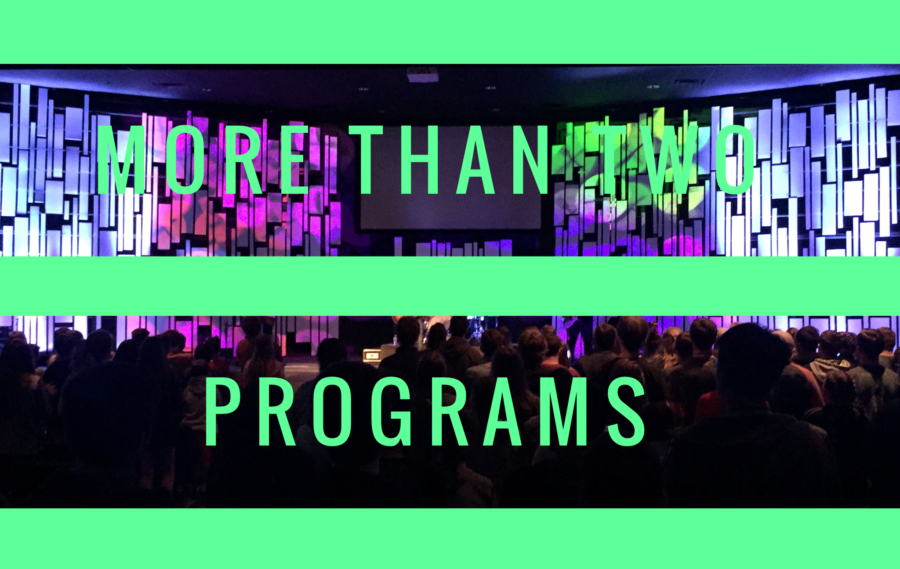by David Hanson | Apr 3, 2017 | On the Job, The Youth Ministry Blog
It’s late in the school year and students are counting down the days until summer break. As a youth pastor, you are in full preparation for the craziness that is summer in youth ministry. But before you write off the school year, remember that you still have around two months on the mission field in your local schools. Your youth ministry challenge for today is simple, but will require some work and initiative on your part.

Youth Ministry Challenge
- Set up a meeting with the principals of the closest Middle/Secondary/Jr. High School and High School.
- Pick their brain about the biggest challenges facing students today. Ask, “What were the biggest obstacles students faced this school year.”
- Ask the principals if there is anything you can do to help them. They almost always will tell you to keep doing what you are doing, but make sure they know you are available and willing to help where needed. (Then follow through when the call does come!)
- Set up a meeting with a few coaches and ask the same questions. Coaches often have a ton of insight as to the challenges facing students.
- Ask the coaches what you can do to bless their team. (Gatorade to practice, help with end of year banquets, etc.)
Boom! There you have it. This is enough to fill your calendar for the next couple of weeks. Now go make some calls and send some emails!
Click Here to Join the Party
& Get a Freebie!

David Hanson: Texas native, Texas Tech Red Raider, M.Div. at Truett Seminary, husband to Ashley, father to Ava, Ben & Madelyn, Student Pastor at The Fellowship in Round Rock, Tx, table tennis (ping-pong) extraordinaire, addicted to coffee. For anything else…you’ll just have to ask.
by David Hanson | Mar 28, 2017 | On the Job, The Youth Ministry Blog
What’s up buddy? Hey pal! Hey, how are (you) today? Hello friend! Hey bro! If you are a youth worker, you have (without question) used these phrases in the last week. It can be crazy difficult to remember the names of the students in your small group, let alone, the names of EVERY kid in the entire ministry! However, names matter in student ministry. I was reminded of that this last Wednesday…

After our mid-week programming, all the High School students go grab fast food together. We are stuck in a Chic-fil-a, Canes, Whataburger, In-and-Out rotation with the occasional Panda Express. We usually have a good showing and fill half a restaurant.
This past Wednesday as I was carrying my food and making my way around to all the tables, I stopped at one table of chatty girls. After a few minutes of dialogue, one girl looks at me with doubt in her eyes and asks, “Do you know my name?”
You’ve been here before. This one question, sparked the rest of the table to look at me and ask one-by-one, “Do you know my name?” “I’ve been coming here a year, do you know my name?” “You better know my name!” “I know your full name, so you better know my name!”
Here’s the deal. I’m not what you would call a “names guy.” I have a hard time memorizing names and remembering the names of people who come and go. However, this hasn’t stopped me from doing my best to remember names. At this particular moment, I happen to know the names of everyone around the table, except one with whom I simply hadn’t had much interaction.
The questions kept coming… “What’s my name?” “What’s my name?” “What’s my name?”
No getting out of this one. No leaders at the table to help me out. No sidestepping or moving the conversation along…they were adamant that I demonstrate my knowledge of their identity.
I used wit. “Bailey, stop asking me that.” “Maddie, I don’t know your name,” “Alexis, who are you?” (Two more left…can’t remember one of them…oh man! Play it off!) “I can’t believe you guys are making me do this! Haha! (I walk away as they are laughing.)
I know this scenario hits home. I probably should have just asked the girl her name, apologized, and moved on, but I’m pretty sure I did that last time I saw her…sigh.
Our students long to be known. In a social media driven culture, where students can be followed by everyone, they are truly known by few. This makes the job of a Small Group Leader all the more important. Small Groups should be a place “where everybody knows your name…dnuh dnuh dnuh…and you’re always glad you came.”
If you don’t know every kid in your ministry, make sure that someone does. In larger ministries, make sure you are pushing your Small Group Leaders to memorize names. Names matter. Names matter, because there is a soul behind each name that needs to know:
1) there is a God who knows them better than they know themselves and desires a relationship with them and
2) they have a gospel community and small group where they can be known in the midst of their hurts, pains, joy’s and successes.
Challenge: Name every kid in your small group. Convicted? Good!
Click Here to Join the Party
& Get a Freebie!
[guestpost]
David Hanson: Texas native, Texas Tech Red Raider, M.Div. at Truett Seminary, husband to Ashley, father to Ava, Ben & Madelyn, Student Pastor at The Fellowship in Round Rock, Tx, table tennis (ping-pong) extraordinaire, addicted to coffee. For anything else…you’ll just have to ask.
[/guestpost]
by David Hanson | Mar 6, 2017 | On the Job, The Youth Ministry Blog
As youth pastors, we have all received the age-old question from inquiring minds that discover we are full-time employees of the church: “So, what do you do all day?” And the truth is, you better have a dang good answer for them. No, really…practice how you answer that question! If you can’t justify your job, then why should they? To many outsiders and parents, it appears we just put on two programs a week. While we both know there is much more to youth ministry (i.e. evangelism, mission, discipleship, fellowship, service, worship, parent ministry, etc.), I want us to step back and give an honest assessment of our output. Are you producing more than just two programs a week? Furthermore, are you creating or simply executing a rehearsed weekly routine? Let’s break this down…

- Are you producing more than just two programs a week?
Be honest with yourself full-timers. While we want our weekend and mid-week services to be stellar, if you were operating in the corporate world, would a boss who is regularly monitoring your output be satisfied? Would you even have a job?! Now before you start justifying how you are spending your time, remember that our bi-vocational friends execute two services a week and still make time to disciple parents and students.
So let me ask again. What will you accomplish and produce this week?
Ephesians 5:15-17 states, “Look carefully then how you walk, not as unwise but as wise, making the best use of the time, because the days are evil. Therefore do not be foolish, but understand what the will of the Lord is.”
Could you honestly say you are making the best use of your time? Want some help creating an Ideal workweek? I’ve done multiple previous posts on how to maximize your week.
- What are you creating?
I believe that God creatively created us to create. Rather than continuing to do what you’ve always done, create something new this week? Shoot a video that trains parents on social media. Brainstorm four new ideas that require you to get outside the walls of the church to reach students for Christ. Find ways to get students outside the church to serve others.
“Serve God by doing common actions in a heavenly spirit, and then, if your daily calling only leaves you cracks and crevices of time, fill them up with holy service.” Charles Spurgeon
We have all fallen into the trap of mediocrity by simply doing what is required of us. So what will you create this week to bless and serve your church? What would make parents take notice that you are there to serve them, not just serve students? Be creative!
Click Here to Join the Party
& Get a Freebie!
[guestpost]
David Hanson: Texas native, Texas Tech Red Raider, M.Div. at Truett Seminary, husband to Ashley, father to Ava, Ben & Madelyn, Student Pastor at The Fellowship in Round Rock, Tx, table tennis (ping-pong) extraordinaire, addicted to coffee. For anything else…you’ll just have to ask.
[/guestpost]
by David Hanson | Jan 21, 2017 | On the Job, The Youth Ministry Blog
Question: Do your leaders know what to do if a student comes to them in a crisis? As I met with my Small Group Leaders over the past month, a common desire was to know how to respond to students walking through a difficult season. For this reason, I shot a video to cover our 3 Step Crisis Response. Check it out:
In this video I covered the three steps I want our Small Group Leaders to take when a student approaches them with a crisis situation.
- Clarify – Before jumping to conclusions or dismissing a statement as irrelevant, it’s important to clarify what a student is saying. Use phrases like: What do you mean? Explain that to me. What does that look like? This will ensure you are seeing and understanding what the student is actually telling you.
- Notify – When a student confesses that they are walking through a troubling time, it’s always the best bet to play it safe and relay the situation to a paid staff member. They will help you with your response and determine what steps need to be taken next. As a youth worker, you are a mandated reporter and must notify the appropriate authorities if a student confides that they are in harms way. When it doubt…notify the youth pastor!
- Follow-through – It doesn’t matter if the crisis situation was monumental catastrophe or a momentary unwarranted worry, you will earn the trust of students if you follow-through. In the follow-through you get to be pastoral and regardless of the situation, point them back to the love, grace, mercy, and comfort of Christ.
I hope this helps you think through how you are communicating with leaders and encourage you to steal this video or remake it yourself. Just give your leaders a plan for crisis situations!
Like what you read? Join our mailing list and I’ll send you a special bonus!
Sign-up & Send Me a Bonus!
[guestpost]
David Hanson: Texas native, Texas Tech Red Raider, M.Div. at Truett Seminary, husband to Ashley, father to Ava, Ben & Madelyn, Student Pastor at The Fellowship in Round Rock, Tx, table tennis (ping-pong) extraordinaire, addicted to coffee. For anything else…you’ll just have to ask.
[/guestpost]
by David Hanson | Nov 21, 2016 | On the Job, The Youth Ministry Blog
Can I admit something to you? I struggle with fellowship in student ministry. Don’t get me wrong; fellowship takes place at almost every event and gathering. But I struggle with fellowship when it’s just fellowship for the sake of fellowship. I know this sounds crazy, because most people outside of student ministry just assume that “hanging out” is ALL we do. So perhaps my frustration with fellowship has less to do with the true nature of fellowship and more to do with the perception of fellowship in student ministry. Perhaps, the problem is the way I define fellowship. Let’s explore…

If you were to ask a random adult or student to define fellowship, they would most likely gravitate toward the concept of “hanging out” or “spending time together.” And while this is one element of fellowship, it sells fellowship far short. And because I hate the idea that people think my job is to simply “hang out” with students, I place a greater weight on the concept of discipleship within student ministry. I’d much rather talk about discipleship within student ministry than talk about fellowship; but one is often dependent upon the other.
So what is fellowship?
“And they devoted themselves to the apostles’ teaching and the fellowship, to the breaking of bread and the prayers. And awe came upon every soul, and many wonders and signs were being done through the apostles. And all who believed were together and had all things in common. And they were selling their possessions and belongings and distributing the proceeds to all, as any had need. And day by day, attending the temple together and breaking bread in their homes, they received their food with glad and generous hearts, praising God and having favor with all the people. And the Lord added to their number day by day those who were being saved.” Acts 2:42-47
In this passage, fellowship seems to encompass the breaking of bread and prayers. Eating food together, praying, and listening to teaching had a profound effect on their community. The camaraderie that came from unity in Christ led to many signs and wonders as well as the growth of their community. God added to their number day by day. The love and acceptance experienced by all provided the platform for the Spirit to move.
So what does this look like in student ministry? How does our fellowship provide the platform for worship and discipleship to take place?
I would argue that it begins with food and shared community.
During the holidays, I choose to remember the power and definition of fellowship. We had a Thanksgiving Potluck for the purpose of food and shared community, and will have a Christmas party for the same purpose. I say, “shared” community because the church has a tendency to close in on itself and get inward focused rather than being outward focused.
We want to share our community and food…not hoard it.
We want outsiders drawn in and those inside drawn toward one another. We want our students to have “all things in common,” even if only for a night where they rally around food and throwing a frozen turkey. (So fun!)
We want a fellowship that grows day by day, and the opportunity for God to change hearts through worship and teaching.
Fellowship is powerful. As youth workers, we must be intentional in the way we structure our fellowship and more importantly, the way we communicate the purpose of fellowship to our adult leaders and volunteers.
Rant over.
What kind of fellowship events are you doing this Thanksgiving/Christmas season? Comment below!
Click Here to Join the Party
& Get a Freebie!
[guestpost]
David Hanson: Texas native, Texas Tech Red Raider, M.Div. at Truett Seminary, husband to Ashley, father to Ava, Ben & Madelyn, Student Pastor at The Fellowship in Round Rock, Tx, table tennis (ping-pong) extraordinaire, addicted to coffee. For anything else…you’ll just have to ask.
[/guestpost]
by David Hanson | Oct 13, 2016 | On the Job, The Youth Ministry Blog
Over the past few weeks, I’ve been thinking through what separates “good” youth pastors from a “bad” youth pastors. While that might sound strange, I’ve been praying through how to best lead/train two staff members that are new-ish to youth ministry. What follows is what I think separates a good youth pastor from a bad youth pastor. This is by no means an exhaustive list, but what’s been on my mind, and what I covered with my team.

Good Youth Pastors make disciple makers.
Bad Youth Pastors fail to equip students with a Great Commission mentality.
Does youth ministry need to be fun? Yes. Does youth ministry need to be entertaining? Yes. Does youth ministry need to be about getting as many students as possible to look toward the excellencies of Jesus? Of course!
But youth ministry first and foremost needs to be about disciple making. Not only do we need to make disciples, but we need to make disciples, who make disciples, who make disciples. Are your students equipped to share their faith? Would they even know where to start? Good youth pastors empower and equip students to share their faith.
Good Youth Pastors know that ministry is all about relationships.
Bad Youth Pastors too often place tasks and to-do lists above people.
There are a million things that can keep youth pastors busy. There is always a lesson to write or something to clean up. While we should hold ourselves to the highest standard of professionalism in the product and programs that we facilitate, but this should never come at the expense of relationships.
No level of excellence is worth sacrificing relationships. And in the end, your perfect program and message will fail if it’s not supported by a foundation of relationships.
Time for some self-evaluation:
- How much time did you spend behind a computer this week vs. time spent with people?
- How many students did you counsel or disciple this week?
- Name a few students outside your ministry that you are trying to reach.
- How many leaders have you met with to encourage recently?
- How many potential new leaders have you met with recently?
- What keeping you from pursuing relationships?
Check out Part 1 of Good Youth Pastor vs. Bad Youth Pastor here.
Check out Part 2 of Good Youth Pastor vs. Bad Youth Pastor here.
Also, check back tomorrow for the two more tips! Want to make sure you get the rest of the list? Get on our email list and you will never miss a thing!
Click Here to Join the Party
& Get a Freebie!
[guestpost]
David Hanson: Texas native, Texas Tech Red Raider, M.Div. at Truett Seminary, husband to Ashley, father to Ava, Ben & Madelyn, Student Pastor at The Fellowship in Round Rock, Tx, table tennis (ping-pong) extraordinaire, addicted to coffee. For anything else…you’ll just have to ask.
[/guestpost]
by David Hanson | Oct 12, 2016 | On the Job, The Youth Ministry Blog
Over the past few weeks, I’ve been thinking through what separates “good” youth pastors from a “bad” youth pastors. While that might sound strange, I’ve been praying through how to best lead/train two staff members that are new-ish to youth ministry. What follows is what I think separates a good youth pastor from a bad youth pastor. This is by no means an exhaustive list, but what’s been on my mind, and what I covered with my team.

Good Youth Pastors prioritize time.
Bad Youth Pastors wonder where the week went.
You should approach your weekly schedule and routine the way Dave Ramsey approaches money. You can either tell your time where to go or you will wonder where it went and why you don’t have enough of it. Youth workers, please hear me! If you want to be treated like a professional in your field…then act like one. If you need more time to spend with people, more time to work on messages, or more time to invest in your own family you have to be disciplined in structuring your time.
If you need help building an ideal workweek, I have help for you here.
Good Youth Pastors involve parents and adults.
Bad Youth Pastors think they can and should handle everything.
This is something that I believe every young leader wrestles with early in ministry. In an effort to prove worth and credibility many young leaders try to tackle everything by themselves. They think that working longer hours and running solo somehow justifies their position when in reality they are doing more harm to their perception than good. Good youth workers understand the importance and benefit of bringing parents and adults on board. Parents on board with your ministry will help you tackle tasks, disciple students, and advocate for the student ministry.
This concept has been a huge push in youth ministry recently and you can learn how to do this more effectively by chasing down one of the following sources:
Check out Part 1 of Good Youth Pastor vs. Bad Youth Pastor here.
Also, check back tomorrow for the two more tips! Want to make sure you get the rest of the list? Get on our email list and you will never miss a thing!
Click Here to Join the Party
& Get a Freebie!
[guestpost]
David Hanson: Texas native, Texas Tech Red Raider, M.Div. at Truett Seminary, husband to Ashley, father to Ava, Ben & Madelyn, Student Pastor at The Fellowship in Round Rock, Tx, table tennis (ping-pong) extraordinaire, addicted to coffee. For anything else…you’ll just have to ask.
[/guestpost]
by David Hanson | Oct 11, 2016 | On the Job, The Youth Ministry Blog
Over the past few weeks, I’ve been thinking through what separates “good” youth pastors from a “bad” youth pastors. While that might sound strange, I’ve been praying through how to best lead/train two staff members that are new-ish to youth ministry. What follows is what I think separates a good youth pastor from a bad youth pastor. This is by no means an exhaustive list, but what’s been on my mind, and what I covered with my team.

Good Youth Pastors stay spiritually nourished.
Bad Youth Pastors rely on their gifts and charisma.
This feels like a no-brainer, but far too many pastors have bowed out due to moral failure stemming from spiritual malnourishment. If you are a pastor who is not prioritizing your pursuit of Jesus frustration is waiting around the corner. You can fake it for a while, but eventually you will need more than your charisma. When you try to lead a ministry out of step with Jesus you are not walking in the fullness of blessing and your ministry will suffer.
Good Youth Pastors see the full picture.
Bad Youth Pastors oil the squeaky wheel.
Youth workers are required to do A LOT. I fight tooth and nail that we have one of the most difficult jobs in the church! While people hate the implications of what I’m about to say, logistically it holds true: The youth ministry is a church within a church. (Hear me out!) Logistically, youth ministries have to execute all the duties of a church. We have to plan, train, and execute fellowship, discipleship, worship, ministry, missions, events, services, budgets, communication strategies, and leader training for our own ministry. Not to mention that we balance the expectations of staff up-lines, students, and parents while operating our ministries at the strangest hours!
Good youth pastors remember to keep the full picture in mind. Bad youth pastors oil the squeaky wheel or chase what seems to need attention rather than sticking to a plan and keeping the big picture in mind.
Check out Part 2 of Good Youth Pastor vs Bad Youth Pastor here.
Check back tomorrow for the two more tips! Want to make sure you get the rest of the list? Get on our email list and you will never miss a thing!
Click Here to Join the Party
& Get a Freebie!
[guestpost]
David Hanson: Texas native, Texas Tech Red Raider, M.Div. at Truett Seminary, husband to Ashley, father to Ava, Ben & Madelyn, Student Pastor at The Fellowship in Round Rock, Tx, table tennis (ping-pong) extraordinaire, addicted to coffee. For anything else…you’ll just have to ask.
[/guestpost]
by David Hanson | Aug 9, 2016 | On the Job, The Youth Ministry Blog
A few weeks back, I wrote a piece discussing whether youth ministries should split summer camp between high school and middle school. You can read that post here. After heading to Student Life in Estes Park, CO with my High School students, I’m ready to finish my assessment and opinion on splitting summer camp.

What were the benefits of splitting?
First, splitting camps allowed us to be laser focused.
Let me state the obvious: Middle school students and high school students have different expectations of camp. Splitting camps allowed us to focus our energy on the wants, needs, and desires of both demographics.
Our high school students love extended worship with just our own group and our middle school students love the freedom to roam, play more, and just be active. It was refreshing to be able to provide both without compromising.
Second, splitting camps allowed us to develop relationships.
Yes, relational growth happens at every camp, but here is what I’ve noticed. When you do camp together, high school students tend to monopolize the time of leaders, leaving less intentional time with middle school students.
By nature, adult volunteers tend to identify more with high school students in that they enjoy conversation and lack the endless fountain of energy that is a middle school student. This isn’t science, so don’t hang me, but it’s what I’ve seen at camp even when we make a strong emphasis for leaders to prioritize 6th-8th students.
But David, isn’t this why you bring leaders to focus on specific grades/demographics? Yes, of course, but nothing beats making those grades/demographics the sole focus for an entire week. When 8th graders are not under the shadow of upperclassmen they feel the freedom to step up and lead. When middle schoolers aren’t afraid to look silly in front of upperclassmen they let loose and it’s awkwardly amazing!
What were the drawbacks of splitting camp?
I’m exhausted! When you are out of town three out of six weeks to multiple camps and mission trip, up becomes down, mass hysteria sets in, your family doesn’t recognize you, and you come home to an inbox with 200+ unread emails.
I tend to exaggerate, but on the real, my eight month old daughter started crawling while I was at high school camp, so it felt that way…
Another drawback was that momentum felt weird. I came out of middle school camp hyped about the relationships built but didn’t feel like I got to follow through with those students until after high school camp and the mission trip…5 weeks later.
When you have to begin preparation for the next trip immediately upon return, it’s difficult to celebrate, recognize, rest in all that God accomplished.
The school system has essentially turned summer into a two-month sprint. Somehow our church squeezed middle school camp, high school camp, mission trip, a VBS for our two campuses, iWorship (kids), and family camp into eight weeks. That’s six weeklong events in eight weeks…insane!
So would you split camp again?
The jury is still out. (Really David, after all this you won’t give us an answer?) That’s right. There were more pros than cons, but as an optimist, I could come to the same conclusion if we did camp together. I’ll leave you with this. If you have the numbers, budget, volunteers, and bandwidth to try it…try it. We are now processing what next summer will look like and I’ll update this page, when we make the decision!
Click Here to Join the Party
& Get a Freebie!
[guestpost]
David Hanson: Texas native, Texas Tech Red Raider, M.Div. at Truett Seminary, husband to Ashley, father to Ava, Ben & Madelyn, Student Pastor at The Fellowship in Round Rock, Tx, table tennis (ping-pong) extraordinaire, addicted to coffee. For anything else…you’ll just have to ask.
[/guestpost]
by David Hanson | Jun 29, 2016 | On the Job, The Youth Ministry Blog
This year we tried something we have never done before. We took a leap of faith and split our Middle & High School Camp. Last year we took 148 to Student Life in Glorieta, NM and had been going to Glorieta for the previous 3 years. This year, however, we felt it was time for a change. Not only would we pick a different location, but we would split our Middle & High School Camps. Here are my thoughts after returning from Middle School Camp:

What led to the decision?
First, it’s important to note that we made the decision to split out our camps after attending the Middle School Ministry Campference, or just “Campference,” put on my Marko and The Youth Cartel (this is an excellent choice if you are looking for a place to spend your conference budget this year).
At the Campference we got to hear a lot about CIY “Christ in Youth,” met a few of their leaders, and learned about MIX which is specifically designed for Middle School students.
Having just separated our Sunday morning programming to a Middle School and High School hour, we thought, “Why not? If we are splitting our Sunday programming to be more intentional with our Middle School students, why not split our Summer Camp for the same reasons?” So we pulled the trigger. This year we took 88 to MIX at the University of Central Oklahoma in Edmond and have 80 signed up to go with us to Student Life in Estes Park, CO.
So how did the students respond?
Being the first time we split MS/HS for summer camp we did run into a few situations. Primarily, our 8th graders were not fans of this decision. But to be honest, they were not fans of us splitting the Sunday services either. At this point, they identify more with the classes above them, than they do with the classes below them. However, we know their presence in the Sunday Middle School service and on the Middle School trip would allow this grade to step into a role of leadership rather than just being the middle child during both.
While unpopular with our 8th graders, the 8th graders who did attend camp stepped up into some serious leadership. At the beginning of the week they were timid and hesitant, but by the end of the week they were exhorting younger students and leading the way.
Our 6th & 7th grade students loved being the center of attention for the week. While they enjoy the older students in our ministry, I think they felt a certain degree of ownership of the trip. They were less hesitant to speak up, be silly, be themselves, and volunteer for games, prayer, etc. I have a feeling that if we were to split our camp again next year, the new 8th graders would be all about being the top dogs on campus.
So what did you think as a youth pastor?
Let’s start with the positives: From a leadership perspective, I was blown away by how thoughtful and intentional MIX was with their programming (read presentation from stage). It would be impossible for a middle school student to get bored or lose focus during a session at MIX. They thought through every aspect of what a middle school student wants and how they think and respond during a session. They blended worship, teaching, games, videos, and skits flawlessly to convey a consistent theme (Kingdom Workers) and hold the attention of middle school students. Consider that a high praise as I’ve gone to camps as a student for 6 years and a youth worker for 10.
Furthermore, their recreation time was well thought out and not just an afterthought. You could see the time and creativity they put into making sure recreation was not just some combination of tag or dodge ball. They built entire backstories, complete with videos, into their rec time activities that encouraged students to engage and not just zone out. Their rec leaders were not just random college students, but THE BAND! You heard me right. They had the different band members lead each team at rec.
The worship team was not just there to lead from the stage, but they led off the stage, which got many students even more excited about worship. While High School students might prefer the “celebrity worship leaders,” this was the right call for Middle School students.
I can’t say enough about how impressed I was with what MIX provided for Middle School Students. The only hiccups during the week had more to do with the location of the camp and the college campus. More specifically, I was underwhelmed by the free time options. In high heat temperatures there was no access to an indoor gym and there was no water options on campus.
The only option for free time was to play gaga ball, 9-square, ultimate Frisbee, and soccer (all of which we have at home). This was a downer after having been at camps the past 5 years where we had access to a lake/water activities, ropes course, bmx course, hiking, etc. I feel like the same programming on a campground with more free time options would have been perfect.
In addition to few free-time options, the campus expected Middle School students to keep up with a room key and a meal card. Not terrible, but each lost key cost $55 and lost meal cards were $10. That’s like handing a middle school student $65 dollars cash and asking them not to lose it in the course of a week…impossible! We had to come up with a system, but this could have been prevented if we were allowed to leave doors unlocked and only needed a wristband to get in the cafeteria.
So would you split summer camp again?
I have been asked multiple times if I will split camp again next year. If I had to decide this instant, I would totally do MIX again at a different location! However, I reserve the right to change my mind after High School Camp in two weeks. The only thing I miss so far is the opportunity for High School students to pour into Middle School students and the opportunity for Middle School students to watch the way that High School students worship and pursue Jesus.
Stay tuned for my follow up-post after High School camp! Want to make sure you don’t miss the full review? Sign-up to receive post updates delivered straight to you inbox!
Click Here to Join the Party
& Get a Freebie!
[guestpost]
David Hanson: Texas native, Texas Tech Red Raider, M.Div. at Truett Seminary, husband to Ashley, father to Ava, Ben & Madelyn, Student Pastor at The Fellowship in Round Rock, Tx, table tennis (ping-pong) extraordinaire, addicted to coffee. For anything else…you’ll just have to ask.
[/guestpost]










